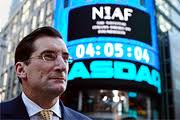BrokerDealer.com blog update courtesy of extract from op-ed section of 28 Sept edition of WSJ by NASDAQ OMX Group CEO Robert Greifeld:
Capital Markets Ride to the Third World Rescue
By Robert Greifeld
Sept. 28, 2014 6:59 p.m. ET
As political chaos and violence spread across the Middle East and North Africa, prospects for regional economic growth would appear to be the least of our concerns. That’s shortsighted. The eruptions of violence stem at least in part from a lack of transition planning following the wave of revolutions, ousters, coups and countercoups that swept the region, including failure to provide functional economic and financial institutions.
If the U.S. government and its allies don’t have a strategy for helping these and other countries emerge from conflict—or to mitigate future calamity elsewhere in the developing world—the private sector can help provide economic continuity. The capital market in particular is a crucial tool for growth and development because it provides long-term infrastructure, IT development and capital access for projects with widespread socioeconomic benefits such as roads, water and sewer systems, housing, energy, telecommunications and public transport.
Global capital markets also ensure an efficient and effective allocation of resources, reduce over-reliance on short-term financing for long-term projects, and encourage inflow of foreign capital.
Part of the appeal of capital markets is that they are fundamentally driven by “people power.” They democratize wealth by encouraging broader ownership of productive assets by small savers. The predictable, participatory nature of capital markets enables more people to benefit from economic growth and wealth distribution. And by every reliable measure, the equitable distribution of wealth is a key indicator of poverty reduction and stability.
According to the World Bank, economic stagnation and its attendant lack of social progress rank among the top grievances fueling poverty, disenfranchisement and conflict around the world. Yet wherever capital markets exist and thrive, we find the kind of productive, long-term investments that can inspire a cultural shift and give people a stake in the future of their countries.
Look at Sri Lanka. In 2010 the tiny island nation emerged from decades of traumatic civil war disunited and with widespread physical destruction. Yet in 2012, at the height of the global economic downturn, Sri Lanka posted 6.4% growth. Instrumental to its rapid economic growth was the Sri Lankan capital market. Raising long-term finance through the capital market has allowed large-scale reconstruction projects such as roads, highways, schools and other critical infrastructure to advance their economic ambitions. The country is healing, and the economic growth spurred by the capital markets is cementing a new national identity and promise for Sri Lanka.
Financial-market exchanges can also play a part in starting or fueling capital markets in “frontier” and emerging economies, moving from or on the brink of instability via an advisory or partner role. For instance, Nasdaq has helped develop and upgrade capital markets in countries like Colombia—which only a decade ago was riven by the violent drug trade—and Bahrain, which was a pioneer in recognizing the need for a modern, service-based economy. Continue reading

